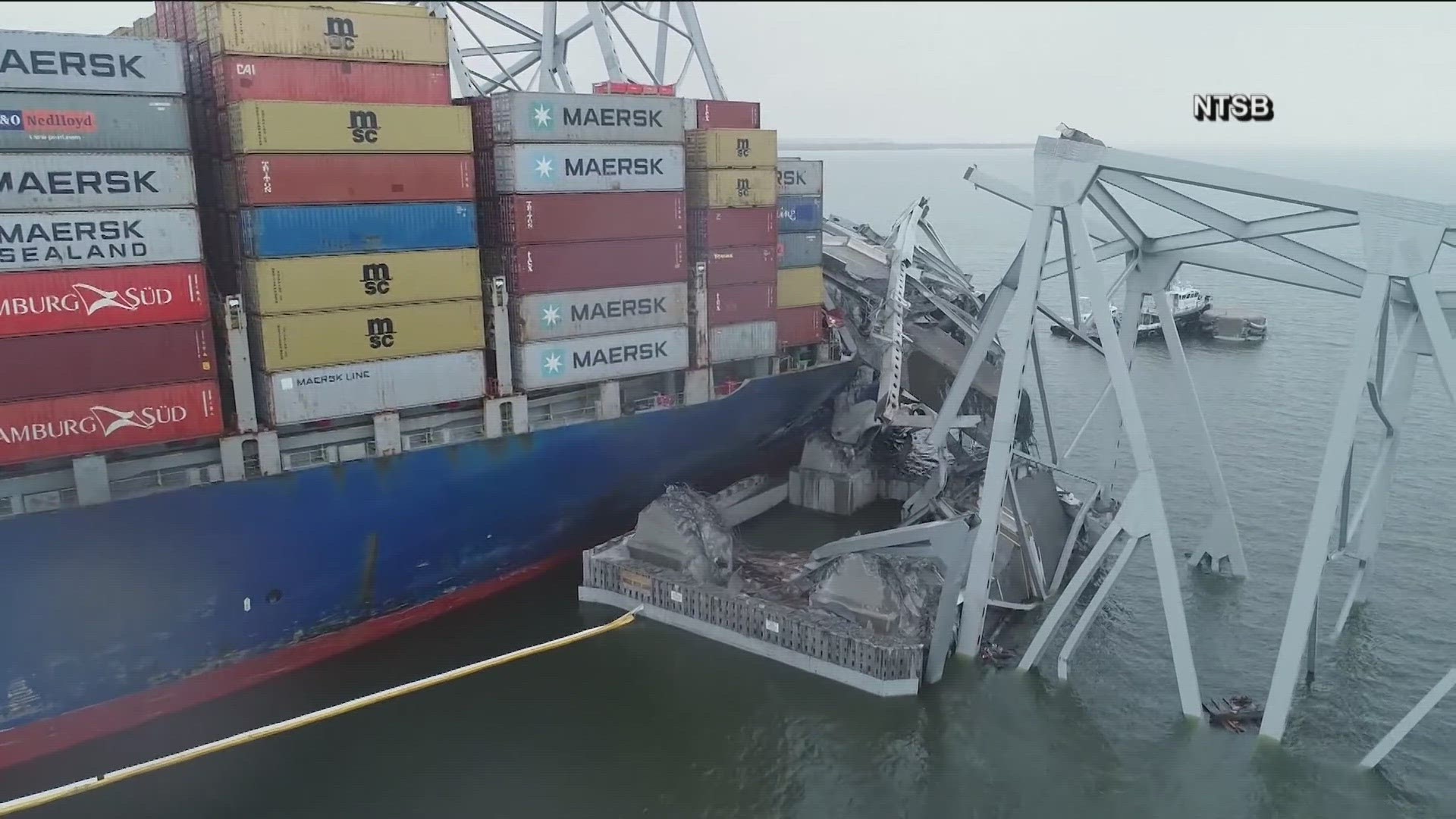BALTIMORE — Federal regulators last year sanctioned the company that chartered the Dali, which crashed into and collapsed the Francis Scott Key Bridge in Baltimore Tuesday, for firing a whistleblower who had reported safety problems on one of the company's vessels to the U.S. Coast Guard.
Maersk Line Limited bills itself as the largest owner and operator of U.S. flag vessels operating internationally. While the company didn't own or build the Dali, a 948-foot cargo vessel, it chartered the ship for a client on the now infamous voyage.
Maersk Line is now finding itself in the spotlight after one of the cargo container ships it chartered, the Dali, lost power and crashed into the Key Bridge in a terrifying and deadly incident caught on multiple camera angles.
Six people are believed to have died as a result of the bridge collapsing.
But it's not the first time a Maersk Line vessel has had problems, and the company is known to U.S. regulators as one willing to take retaliatory action against whistleblowers.
A complaint to the Coast Guard
In July 2023, the U.S. Department of Labor issued a report accusing the company of retaliating against the first mate of an unnamed vessel. According to the report, which was first covered by Lever News, the man sent a report in December 2020 to Coast Guard regulators about deficiencies on board the ship.
The first mate reported that "the lifeboat block and releasing gear were inoperable, crew members were in possession of alcohol and drinking onboard, the emergency fire pump was not working, trainees were standing watch unsupervised, and the cargo hold bilge system needed repairs as it was causing flooding," according to the DOL report.
On Dec. 29, Coast Guard personnel boarded the ship for an inspection, which the first mate assisted with. During that inspection, the Coast Guard noted in their report that there was a substantial leak in the fire main, a cracked safety rail and other problems with the ship.
Immediately after the inspection, the report claims, the first mate was relieved of his duties by the captain and told to leave the ship.
Months later, after hearing no word about when he would return to the vessel, the first mate received notice from Maersk that he was being fired.
'OSHA finds that this policy is repugnant'
Maersk justified the firing by saying he failed to follow the company's procedure for dealing with safety issues: bringing them up with higher-ups in the company to be fixed before notifying the coast guard.
"Reporting to (the coast guard) shall only take place, after discussing the issue with the respective Ship Superintendent, Fleet Group, and the Marine Standards team.
In the report, the DOL says Maersk's vice president of labor relations admitted that the reporting policy "requires seamen to report safety concerns to the company and allow it time to abate the conditions before reporting to the USCG or other regulatory agencies."
In layman's terms, the policy allows the company to fix the problems before informing federal officials, preventing any consequences that could be brought down by an immediate investigation.
Federal regulators said the policy flies in the face of the Seaman's Protection Act, which protects whistleblowers who report safety issues to the coast guard.
The Occupational Safety and Health Administration, more commonly known as OSHA, lambasted the policy, saying it prevents sailors from coming forward to prevent dangerous conditions.
"OSHA finds that this policy is repugnant to the Act and creates a chilling effect because it dissuades employees from reporting any safety concerns directly to the USCG or other federal, state, or local regulatory agencies," the agency noted in the DOL report.
'Standard business practice'
The Seaman's Protection Act was established in 1984, designed to increase safety for those working on seafaring vessels by prohibiting their employers from retaliating against them for reporting unsafe working conditions to any government regulatory agency.
But according to a blog post from the Spagnoletti Law Firm, which specializes in maritime lawsuits, Maersk isn't the only company to have such a policy. They say despite the law being in place for decades, there have been relatively few whistleblower complaints from seamen.
"The conjecture that many have drawn is that this lack of whistle blowers was because most employers had a company policy in place to prevent employees from directly contacting the USCG, OSHA or other regulatory bodies," the blog post said.
In fact, according to the law firm, "it is 'standard business practice' for employers to prohibit any direct contact by employees with government regulatory bodies." Experts testified as much during a whistleblower lawsuit against another shipping company, Horizon Lines, Inc.
What happened with the Dali?
The blistering sanctions report against Maersk does not directly relate to the Dali's loss of power — in fact, no Maersk employees were on board, but it does point to a culture within the company where problems are swept under the rug and out of sight.
The Dali, by all respects, was not obviously at risk for a total engine failure.
According to the Associated Press, the Dali passed a June 2023 inspection in Chile. A faulty pressure gauge for the fuel heaters was identified but fixed before the vessel left the port, according to authorities.
The Dali was then inspected in September by the U.S. Coast Guard in New York, and no problems were found.
Before it left Baltimore, the ship underwent routine engine maintenance, according to the Coast Guard. It's unclear if the engine maintenance was related to the power loss shortly after the container ship left port.
An investigation into the cause of the Key Bridge collision is underway, and National Transportation Safety Board inspectors are currently attempting to piece together the final moments before the crash.

